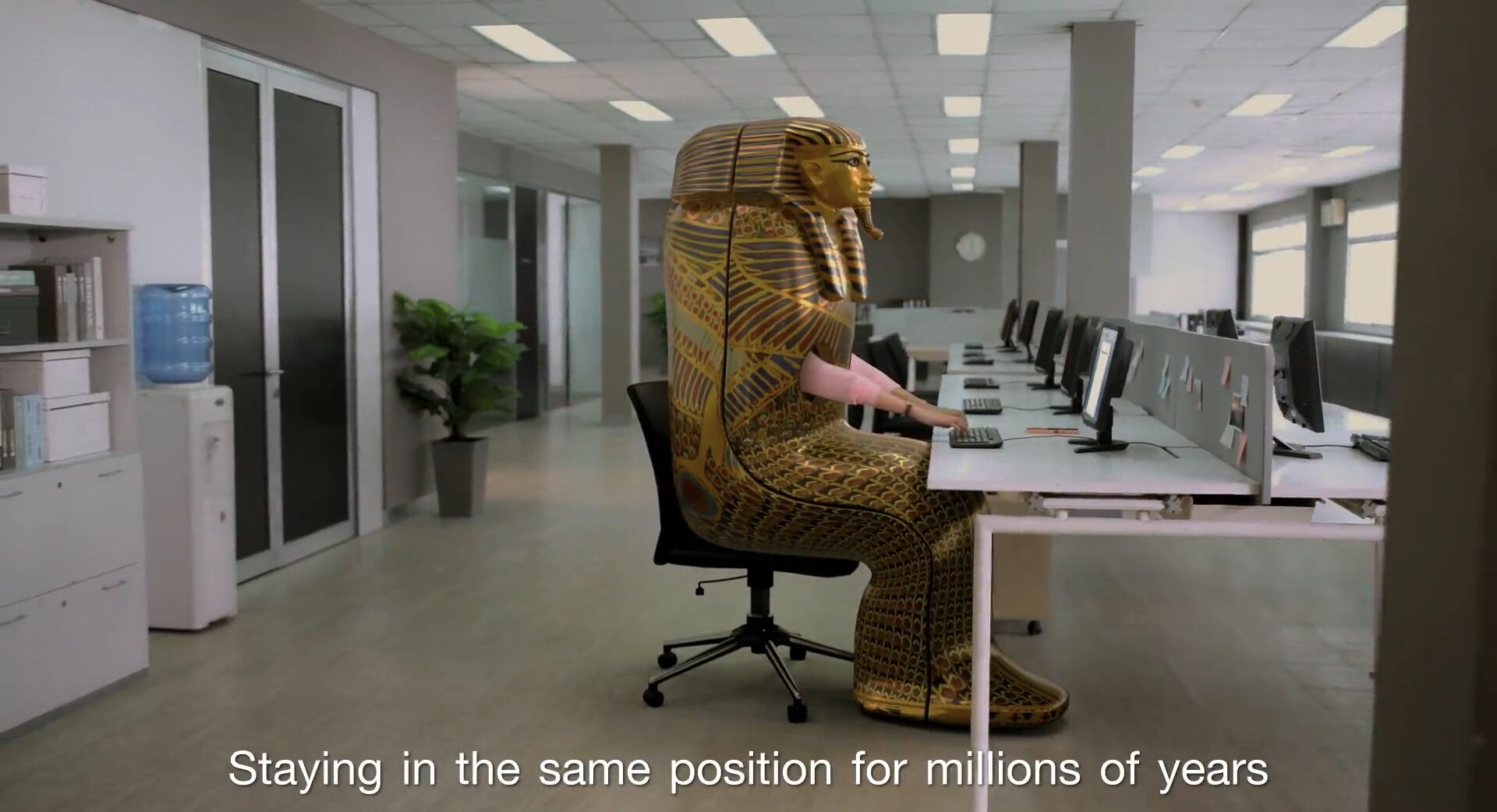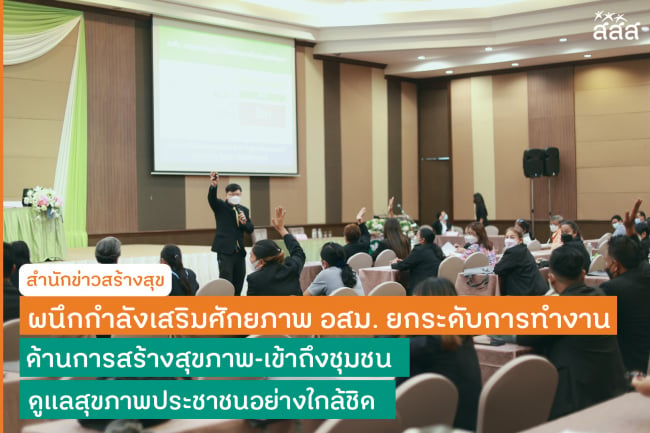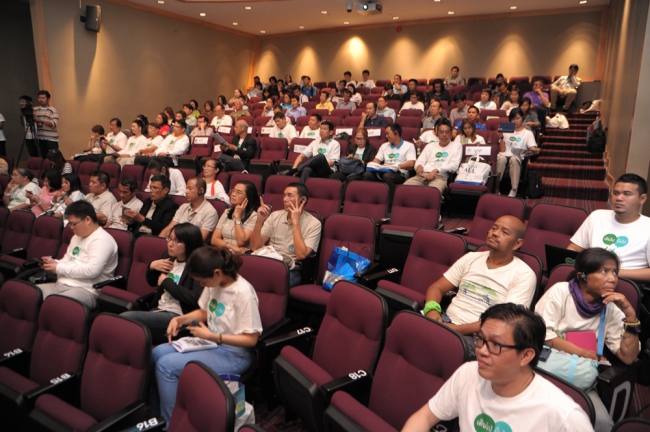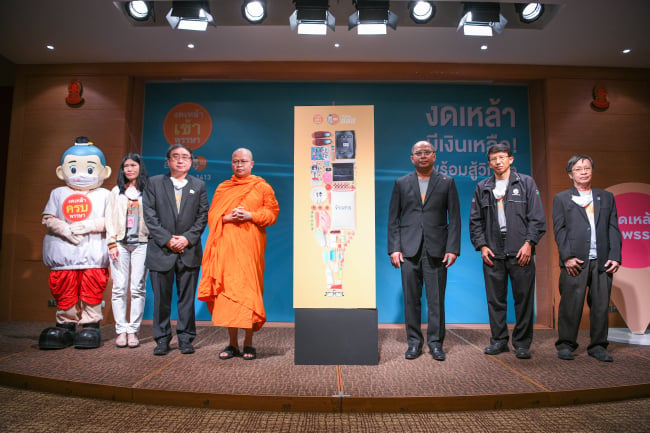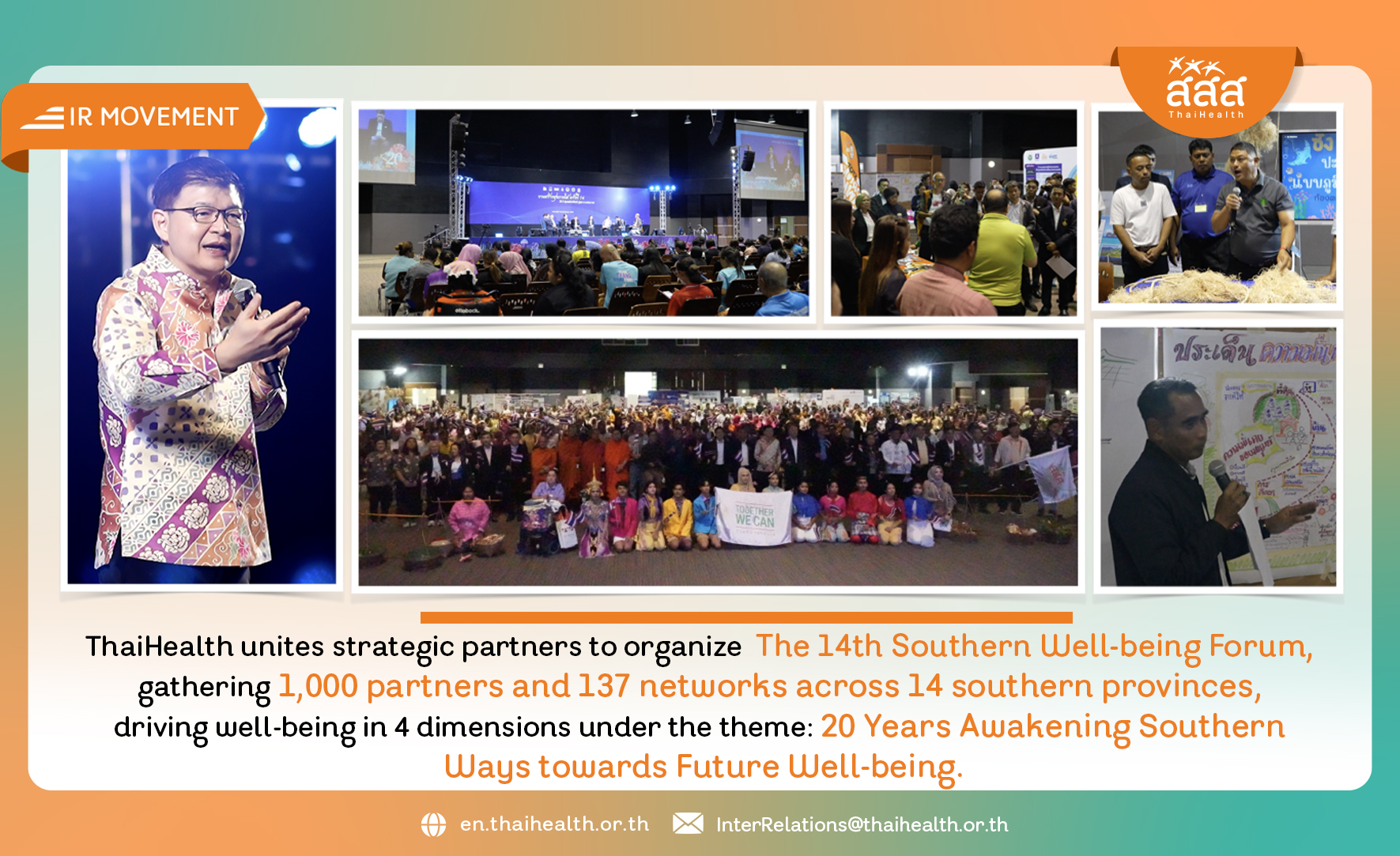
ThaiHealth unites strategic partners to organize “The 14th Southern Well-being Forum,’ gathering 4,000 partners and 137 networks across 14 southern provinces, driving well-being in 4 dimensions under the theme: ’20 Years Awakening Southern Ways towards Future Well-being.
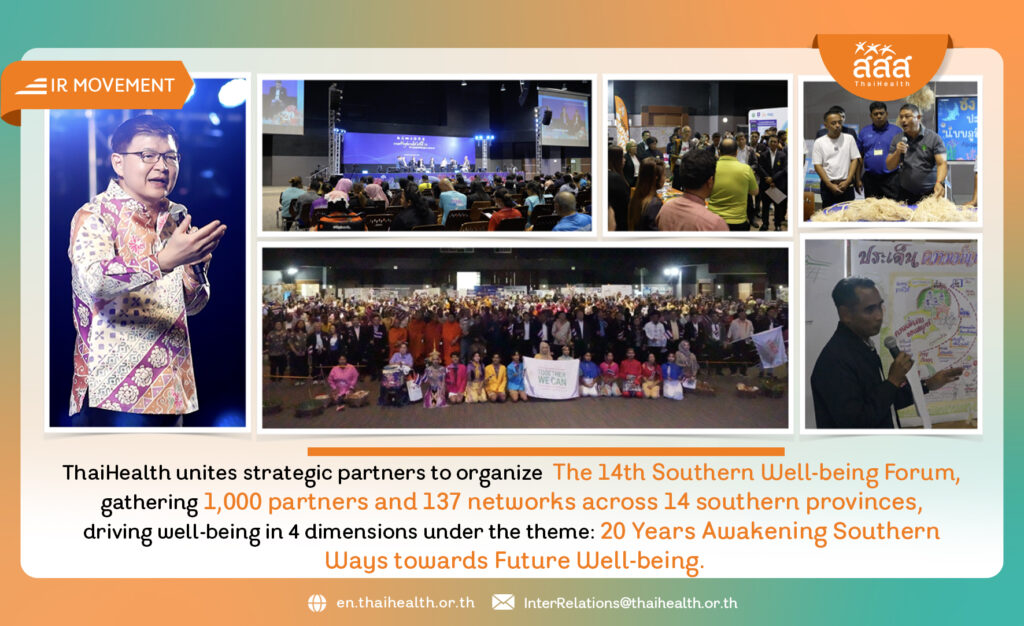
ThaiHealth unites strategic partners to organize “The 14th Southern Well-being Forum,’ gathering 4,000 partners and 137 networks across 14 southern provinces, driving well-being in 4 dimensions under the theme: ’20 Years Awakening Southern Ways towards Future Well-being.
On August 18-19, 2025, at the Main Conference Hall, Prince of Songkla University, Trang Campus, Trang Province, the Thai Health Promotion Foundation (ThaiHealth) joined forces with the National Health Commission Office (NHCO), the National Health Security Office (NHSO), the Ministry of Public Health (MOPH), the Community Organizations Development Institute (CODI), the Trang Provincial Administrative Organization, Trang Health Assembly, and Prince of Songkla University to organize “The 14th Southern Well-being Forum.’
This forum was held to reflect on two decades of building well-being networks in the South of Thailand and to define new directions for its sustainability. Dr. Pongthep Wongwatcharapaiboon, CEO of ThaiHealth, delivered the opening address, stating that the event was not only an exchange platform but also a ‘central mechanism’ enabling networks to join forces across areas and issues to find solutions to the South’s complex problems.
Looking back to 2006, the forum began as the ‘Show, Share, Connect’ forum to open space for community partners, civil society, and local agencies to share experiences and connect. It later advanced with the Health Assembly tool, allowing social power, knowledge, and policy to converge, producing strong and continuous policy proposals. Today, the forum has evolved into a public policy space linking networks across 14 southern provinces, gaining national recognition.
Dr. Pongthep continued that the South faces multifaceted challenges, including climate change, natural disasters, economic vulnerability from reliance on monoculture farming, rising non-communicable diseases (NCDs), and the highest smoking rate in the country – over 1.7 million smokers, about 22% of the population aged 15 and older. The spread of e-cigarette use among youth further reflects new health challenges. All these issues necessitate that southern networks move beyond project-based approaches toward “sustainable systemic management.”
This forum therefore extended 4 key issues into policy proposals: food security—promoting sustainable agriculture and food systems to ensure adequate, safe, and fair access to food; human security—through the framework “5 Goods of Collaboration”: good education, good care, good economy, good housing, and good society; health security—by promoting health across all age groups, controlling tobacco, preventing non-communicable diseases, and strengthening mental health; and natural resources and environmental security—under the principle “From Mountain to Ocean,” ensuring balanced resource management, disaster preparedness, and promoting community-based tourism.
In addition to defining issue-based directions, ThaiHealth CEO emphasized the importance of data-driven decision-making, by returning local well-being data to communities so that people can own the information and manage themselves effectively. He stressed that advancing well-being requires grassroots power, reinforced by supportive roles from national-level agencies.
Dr. Pongthep concluded that true happiness does not depend on money, but is rather “happiness that grows the more it is shared,” especially the joy of seeing others happy. This aligns with the concept of “spiritual well-being” introduced by Prof. Dr. Prawase Wasi, which highlights that genuine happiness comes from realizing one’s value to others. This spirit has made the Southern Well-being Forum not only a platform for drawing lessons but also a gathering of love, compassion, and volunteerism among southern communities to drive sustainable well-being at both regional and national levels.
Dr. Prakasit Kayasith, Senior Assistant CEO and Acting Director of the Partnership and International Relations of ThaiHealth, spoke on the direction of the Southern Well-being Forum movement, noting that the strength of the South lies in adopting a area-based approach, where southerners themselves own the issues and work agendas. This differs from other regions of Thailand, where health topics are the starting point. The Southern Well-being Forum therefore reflects the power of bottom-up initiatives that can systematically connect to national-level policy.
The Southern Coordination Center serves as a “model” for linking practice with policy, bridging national-level agendas with local implementation effectively. It functions as a central platform for network partners to collaborate in advancing initiatives. Importantly, its role extends beyond health, reaching into quality of life, support for vulnerable groups, and environmental issues. The South has also defined four clear strategic areas of work: health, human development, food, and environment.
Dr. Prakasit further explained that systemic advancement requires connections at four levels:
- Policy level, which acts as a “door-opener” for systems to interconnect.
- Management level, which helps reduce redundancy and organizes the logistics of budgets and manpower.
- Operational level, where local partners link “naturally.”
- Support level, which must be based on joint action plans and a shared road map so that organizations such as ThaiHealth can provide targeted support.
“The strength of the southern network is that it owns the issues, designs operations to create change, and addresses health challenges according to its own context. As a strategic supporter, ThaiHealth is pleased to see networks uniting to connect funding sources and support from all sectors, working across issues and across areas to lead the South toward sustainable well-being.”
In terms of recommendations, Dr. Prakasit highlighted two key dimensions:
- Passing policy proposals to national mechanisms, such as the National Health Assembly, to push them into government agendas.
- Designing systematic collaboration, with shared goals, joint action plans, and clearly defined management hubs, ensuring that strategic organizations’ support aligns with local needs. Future advancement will require establishing clear connection structures across policy, management, operations, and support to avoid duplication and increase effectiveness.
On the occasion of the 20th anniversary of health promotion efforts in the South, Dr. Phen Sukmak, Director of the Public Policy Institute, Prince of Songkla University, emphasized the importance of clearly defining the concept of a “Southern Region of Well-being” as a central platform for partners to collaborate. The initiative is grounded in four concrete well-being dimensions: good nutrition, good living, good environment, and happiness—all built upon four forms of “security”: food security, human security, health security, and natural resource and environmental security.
Dr. Phen further noted that the hallmark of this initiative is the creation of multilateral collaboration—involving higher education institutions, government agencies, local administrative organizations, the private sector, and civil society. ThaiHealth has designated the Public Policy Institute of PSU as the central academic mechanism to connect partners across 14 southern provinces, enabling joint analysis and systematic policy advancement. At the same time, emphasis is placed on integrating the work into “regular mechanisms” of agencies, particularly local governments, by embedding it in provincial development plans, regional cluster plans, local administrative plans, or local ordinances. This ensures that efforts extend beyond ad hoc projects and can continue sustainably.



